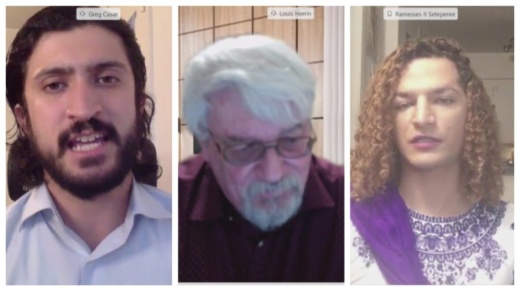By most accounts, the pandemic is not going away soon. Homelessness is still likely to be a top issue in a post-pandemic world, and City Council will have to continue prioritizing solutions. The three candidates running for Austin City Council’s northeast District 4 seat this November laid out their position on how to address homelessness Sept. 23 during a candidate panel hosted by the nonpartisan League of Women Voters.
Incumbent Greg Casar is seeking his second consecutive four-year term on City Council after initially winning a two-year term in 2014 as part of the inaugural 10-1 council dais. Louis C. Herrin III an environmental engineer who has lived in the district for 30 years, and Ramesses II Setepenre, a former contract security guard at Austin City Hall who said he has experienced homelessness, have stepped in to challenge Casar’s re-election bid.
In addressing the mental health needs of the homeless population, none of the candidates believe the city has done enough. Casar and Herrin blamed a lack of resources and limited help from the state and federal government. Setepenre said the city has not addressed the root causes of homelessness and pointed to a lack of social capital and access to quality health care.
However, Casar pointed to his work on City Council during the recent budget session, during which council pulled money from the police department to fund mental health response and create a new 911 dispatch option for mental health crises. With the libraries closed during the pandemic, a place people experiencing homelessness often go for services, Casar said the city needed to ramp up its mental health response.
Herrin criticized the state for failing to help, saying state officials have been “dumping a lot of the mental health problems on the city.” He said the city needs to work on lobbying the state for more help and more funding and set up a “better system” for managing the homelessness situation.
Setepenre said as the only candidate who has experienced homelessness, his perspective on the issue was not “armchair anthropologist.” He said the issue was more complex than mental health and that the city needed to attack homelessness at its foundation and address drug use and lack of family support. The city needs to move beyond a “one-size-fits-all” response, Setepenre said, and bring more experts and professionals to the table.
City Council’s decision to lift the ban on public camping in 2019, opening the ability for those experiencing homelessness to set up camp in more visible spaces, polarized the city in ways elected officials said they had not previously seen. The issue has yet to settle. Encampments have become more visible throughout the city. Between 2019 and 2020, the number of unsheltered homeless individuals grew by 45%. Residents have continued to voice concerns over the city’s handling of what officials one year ago called a “homelessness crisis.”
Herrin said he strongly opposes City Council’s decision to lift the camping ban. He said he believes that the city needs to do a better job of actively engaging the homeless population and trying to get them housed and into workforce development programs that will help them get on their feet.
Setepenre said he understood the concerns around the growing visibility of homeless encampments but that complaining about it is not the way toward progress. He claimed he has personally opened up his one-bedroom apartment for homeless individuals to stay. Setepenre said allowing people to camp might be “mercy” but that it was not going to solve the issue.
Casar, who helped lead City Council action on lifting the camping ban, said he believes the city can effectively end homelessness in the city without violating “anyone’s human or civil rights in order to get there.” He called American homelessness a relatively new problem that worsened after the federal and state governments began pulling money out of mental health and social safety net programs in the 1980s. Casar said the city needed to “make up for lost time” and supported the efforts to pump money into housing services and purchasing hotels to convert into housing-focused homeless shelters.
Election Day is Nov. 3. Early voting runs from Oct. 13-30. Check back with Community Impact Newspaper for more updates on Austin City Council races.





